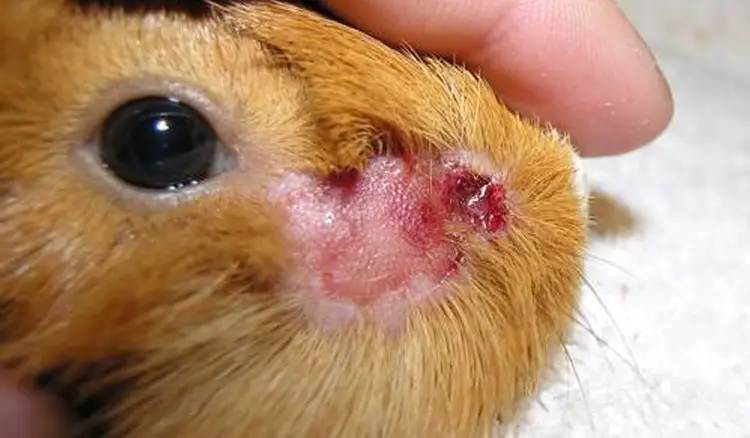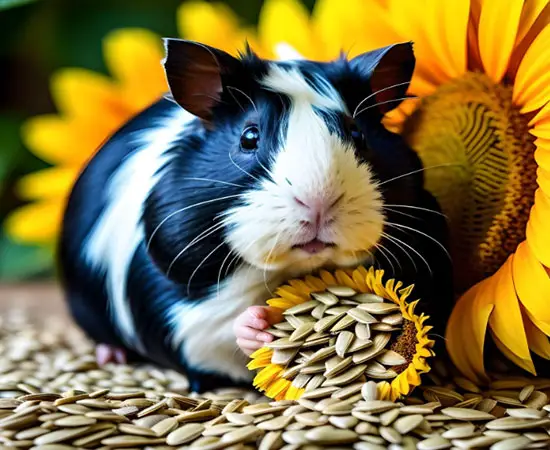An abscess is an accumulation of pus that forms in tissue as a result of a bacterial infection. Abscesses commonly occur under the skin but can also develop in internal organs. Guinea pigs are prone to developing abscesses for a few reasons:
- Their sensitive skin is easily irritated by hay pokes, scratches from housing items, or minor injuries from cage mates. These small wounds can allow bacteria to enter and cause an infection.
- Guinea pigs have very delicate immune systems. If bacteria breach their skin barrier, their body may struggle to wall off the infection and form an abscess rather than resolving it outright.
- Improper nutrition can weaken immune function. Guinea pigs need high levels of vitamin C and low calcium to maintain good health.
What are the symptoms of an abscess in guinea pigs?
Symptoms of a skin abscess include:
- Swelling or lump under the skin. This may feel fluid-filled rather than solid.
- Hair loss over the lump. This occurs as the swelling expands.
- Redness, heat, and tenderness around the area
- Loss of appetite and lethargy, especially if feeling unwell
- Reluctance to move if the abscess is interfering with comfortable ambulation
Internal organ abscesses may cause non-specific symptoms like weight loss, diarrhea, or vomiting. Get veterinary advice if your guinea pig seems ill despite not having obvious skin problems.
What is the treatment for a guinea pig abscess?

Proper treatment of a guinea pig abscess requires:
- Antibiotics. Your vet will prescribe antibiotic injections, oral medication, or both to target the bacteria inside the abscess. Antibiotics also prevent the infection from spreading to the bloodstream.
- Surgical drainage. The pus needs a way to exit the body. Your vet will lance and flush out the abscess to remove debris and bacteria. Some abscesses may be allowed to rupture and drain naturally once antibiotics have been started.
- Wound care. After surgery, you’ll need to gently cleanse the area twice daily using prescribed solutions. Apply antibiotic ointment and fresh bandages. Check for reaccumulation of pus. Your vet can show you proper technique.
- Pain medication. Guinea pigs are prey animals and tend to hide their discomfort. Ensure pain is properly controlled with veterinary-approved drugs like meloxicam or buprenorphine.
- Follow-up exams to confirm complete healing. Some abscesses come back if not thoroughly treated the first time.
Can I treat my guinea pig’s abscess at home?

Treating a guinea pig abscess requires the above medical therapies for the best outcome. However, home care under veterinary guidance may be possible if the abscess opens and drains on its own. In this situation:
- Contact your vet once you notice drainage from an existing skin lump. They can then prescribe antibiotics without anesthesia being required.
- Gently cleanse the ruptured area twice daily using a dilute antiseptic solution (what your vet recommends). Apply an antibiotic ointment prescribed by your vet. Cover with non-stick gauze, not tightly wrapped.
- Check temperature twice daily – a fever over 104°F indicates antibiotics or additional treatment are needed.
- Weigh your guinea pig daily on a kitchen scale. Appetite and weight loss let you know if the piggy is feeling unwell. Call your vet promptly if you note decreased food intake.
- Handle very gently when cleaning the abscess. Guinea pigs will often improve on antibiotics/wound care alone. Call your vet for any concerns about pain, reduced appetite, fever, or abundant drainage.
Home lancing of intact abscesses is strongly discouraged. This risks spreading infection into the bloodstream and abdomen, requiring intensive veterinary care. You also can’t flush the wound properly at home. Wait and allow your vet to surgically open the abscess for you once the medicine has been started.
Are there any home remedies I can try on my guinea pig’s abscess?
There are no effective home remedies for a guinea pig abscess. Treatment relies on prescription veterinary therapies as outlined above.
That said, there are some supportive measures you can take at home to help your guinea pig feel more comfortable until the abscess can be properly addressed:
- Offer softened high-fiber foods and fresh herbs to stimulate appetite
- Provide extra hides/tunnels so they feel secure resting
- Place soft fleece bedding over their usual substrate to prevent irritation
- Ensure their habitat remains very clean and dry
- Check that vitamin C and calcium levels in their diet are appropriate
However, understand these measures only provide comfort, not treatment. Nutrition and hygiene improvements will not resolve an active infection or drain an abscess. A veterinary assessment is required – an untreated abscess will only get worse, risking a systemic infection.
How much does it cost to get an abscess treated?
The cost to surgically drain, flush, and treat a guinea pig abscess averages $100-$350. This includes the office exam, anesthesia, wound prep, antibiotics injection, lab tests if needed, and take-home oral antibiotics.
Factors affecting overall cost include:
- Size and location of the abscess
- What diagnostics or bloodwork are necessary
- Whether hospitalization for IV antibiotics is required
- Type of wound closure performed after drainage
- Length of antibiotics course prescribed
Discuss cost concerns with your vet beforehand so you know what to budget for your guinea pig’s care. They’ll advise you on essential vs. optional elements to best work within your financial capabilities.
Exotic pet care specialists may charge more than general veterinary clinics. However, their expertise with delicate guinea pig surgery and medicine is invaluable. Weigh carefully the risks of substandard care vs. finding ways to fund best-quality treatment.
When should I take my guinea pig to the vet for an abscess?
You need an appointment as soon as you notice:
- Focal hair loss, swelling, redness, heat, and tenderness of the skin
- The presence of an obvious lump beneath the skin
- Your pig showing signs of discomfort like reduced activity or appetite
- Other symptoms of illness in tandem with skin changes
Do not delay seeking veterinary care. Guinea pig abscesses frequently develop into more serious infections requiring intensive treatment to save the pet’s life.
Waiting to see if an abscess heals on its own risks the following complications:
- Rupture internally, spreading infection into the abdomen
- Invasion into bones, joints, blood, lungs
- Development of widespread cellulitis
- Sepsis, organ failure, death
Catching an abscess early vastly improves outcomes before infection can run rampant. Pay close attention to the above symptoms so you can access prompt veterinary treatment.
Can I prevent my guinea pig from getting abscesses in the future?
There are several measures you can take to help avoid recurrent guinea pig abscesses down the road:
- Improve diet with consistent vitamin C supplementation, unlimited timothy hay, limited pellets and fresh veggies. Good nutrition supports immune competence.
- Reduce injury risk by checking for sharp points on housing, removing aggressive cagemates, and supervising playtime when guinea pigs are out interacting.
- Practice exceptional hygiene so minor skin wounds don’t get infected. Spot clean cages daily, full clean weekly, wash all accessories/toys weekly, and replace soiled bedding promptly. Disinfect the habitat between residents.
- Consider probiotics to support healthy gut and skin flora after antibiotic therapy. Vet-recommended options like Bene-Bac or Probios can repopulate beneficial bacteria.
- Discuss long-term antibiotics if your pig suffers frequent abscess recurrence despite preventive measures. This may indicate an underlying chronic infection continually flaring up. Identifying and eliminating that source is key.
The most important aspects are diet, habitat, and maintaining general health between abscess infections. Stronger immunity and wounds that remain sterile are less likely to develop into a problematic abscess again. Partner closely with your veterinarian to determine why your guinea pig seems prone to this issue and customize a plan for improvement.





![What Can Guinea Pigs Eat [A Pro Guide]](https://www.rodentsfamily.com/wp-content/uploads/2023/08/What-Can-Guinea-Pigs-Eat.jpg)
